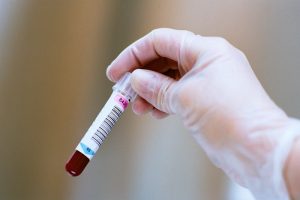Continuity and change
In 2019, the number of procedures to collect blood stem cells for unrelated donors matched the record high of the previous year; the number of confirmatory typing procedures increased slightly. Swiss Transfusion SRC, with its expertise in the field of cellular therapies, is in great demand.
When someone in the Swiss Registry comes up as a possible donor, Swiss Transfusion SRC arranges for confirmatory typing, in which that person’s HLA markers are verified. In 2019, it did so in the case of 273 persons, representing a 5 percent increase over 2018 (260).
In the end, 61 procedures were performed in Switzerland to collect blood stem cells destined for unrelated recipients in 2019. That matched the record high reported in 2018. Two of these procedures were secondary collections, i.e. two donors were donating for the second time.
Four of the collection procedures were destined for patients in Switzerland, the others went to patients all over the world. This is linked to the great diversity of the Swiss registry.
Speed counts
Doctors usually need to find a suitable donor for their patients as quickly as possible. For this reason, Swiss Transfusion SRC continually reviews and improves its processes.
In 2019, a regional pilot project succeeded in speeding up the confirmatory typing process considerably. Implementation of the new process in other parts of Switzerland is slated for 2020.

Transplant procedures in Switzerland
Through its services, Swiss Transfusion SRC plays the role of a hub for the procurement of transplant material: it searches for suitable donors for patients in Switzerland and throughout the world and is responsible for the punctual delivery of transplant material.
In 2019, Swiss Transfusion SRC received 247 search requests from Swiss transplant centres, representing a slight increase over 2018 (230).
A total of 264 transplant procedures were performed in Switzerland in 2019 (2018: 258), with related (111) and unrelated (153) donors. The number of unrelated donor transplants increased by nine compared to 2018 (144).
The numbers of haploidentical transplants have remained stable since 2016, after increasing rapidly for several years before that.
Cellular therapies
Cellular therapies are taking off. However, CAR T cell therapies have only been approved for use in a few specific cases of leukaemia in Switzerland thus far.
Switzerland’s Federal Office of Public Health (FOPH) has now drawn up a list of approval criteria, and Swiss Transfusion SRC is working with the scientific-medical body Swiss Blood Stem Cell Transplantation and Cellular Therapy (SBST) on the requirements for a CAR T evaluation concept. Swiss Transfusion SRC is already handling the data management for the ongoing therapies.
